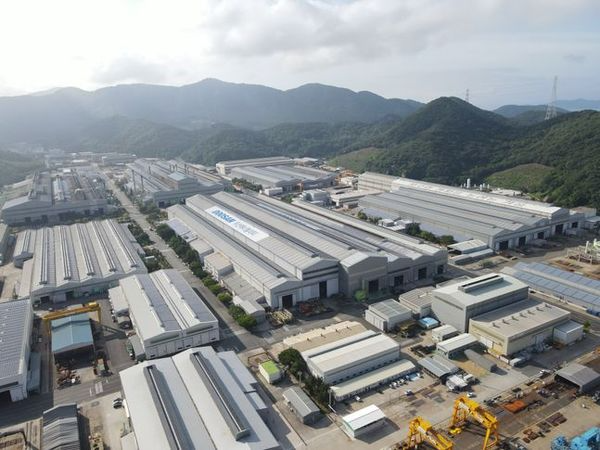 이미지 확대보기
이미지 확대보기Doosan Enerbility is currently preparing to issue a total of KRW 80 billion in corporate bonds, including KRW 30 billion in two-year bonds and KRW 50 billion in three-year bonds. The lead manager is KB Securities, Kiwoom Securities, Korea Investment & Securities, and the underwriting team is known as Daeshin Securities, Yuanta Securities, Shin Young Securities, and Shinhan Investment & Securities. It aims to issue the bonds on the 6th of next month. The securities report has not yet been submitted, and the timing of the demand forecast for institutional investors has not been determined.
In February, Nice Credit Ratings upgraded the rating of Doosan Enerbility's senior unsecured corporate bonds to 'BBB+' from 'BBB' in its ongoing assessment, and changed the outlook to 'Stable' from 'Positive'. The outlook was affirmed at 'BBB+ / Stable' in the latest main review.
It took into account the prospect that sales growth will be possible by reinforcing new profits through localization of the only gas turbine for power generation in Korea. It also reflected the fact that large-scale orders scheduled to be supplied by 2033 from the nuclear power plant business can generate stable operating profits.
Despite this positive outlook, there is still a cold look at the company's upcoming bond issue next month.
Earlier, Doosan Enerbility issued a total of KRW 100 billion in corporate bonds In February. They are KRW 43 billion for two-year and KRW 57 billion for three-year. At that time, it tried to issue KRW 50 billion worth of corporate bonds, including KRW 40 billion for two-year and KRW 10 billion for three-year, but doubled as funds poured into demand forecasting. The bond was a success and lowered the funding rate.
However, the situation is different now. The financial authorities are set to end the tax exemption for high-yield funds at the end of this year, which could reduce investment demand for Doosan Enerbility's bonds. High-yield funds are funds that invest at least 60% in bonds, with at least 45% in bonds rated BBB+ or lower.
 이미지 확대보기
이미지 확대보기The demand for BBB+ corporate bonds in high yield funds increased in the first half of this year as the initial public offering (IPO) market heated up. At the time, BBB-rated corporate bonds were sometimes priced at 100 basis points (bp) or less over the private bond rating agency's benchmark rate.
The reorganization of Doosan Group's business structure and the unstable cash flow of Doosan Enerbility could also be a factor. This is because even if demand for bonds is sufficient, the possibility that negative factors will cause corporate bonds to be issued with over-interest rates (which are determined at the top of the desired interest rate band) cannot be ruled out.
Doosan Group recently announced a business structure reorganization plan to transfer Doosan Bobcat to a wholly-owned subsidiary of Doosan Robotics, including a spin-off and merger between Doosan Robotics and Doosan Enerbility, and a comprehensive share exchange between Doosan Bobcat and Doosan Robotics. There is a backlash as there are voices that minority shareholders have been virtually alienated from the capital transaction process between Doosan Robotics, a deficit company, and Doosan Bobcat, a blue-chip company.
Doosan Enerbility's cash flow is also not good. The company's cash flow after operating activities turned into a deficit of KRW 132.7 billion in the first half of this year from a surplus of KRW 1.2587 trillion in the first half of last year. Cash flow after financing activities fell 13% year-on-year to KRW 317 billion, but its borrowing burden hasn't improved much.
Shin Haeju (hjs0509@fntimes.com)
가장 핫한 경제 소식! 한국금융신문의 ‘추천뉴스’를 받아보세요~
데일리 금융경제뉴스 Copyright ⓒ 한국금융신문 & FNTIMES.com
저작권법에 의거 상업적 목적의 무단 전재, 복사, 배포 금지

















![투자 부담 떠안은 한화오션 장연성, '재무 안정' 시험대 [나는 CFO다]](https://cfnimage.commutil.kr/phpwas/restmb_setimgmake.php?pp=006&w=284&h=214&m=5&simg=20260211140512036600d260cda7511817679169.jpg&nmt=18)





